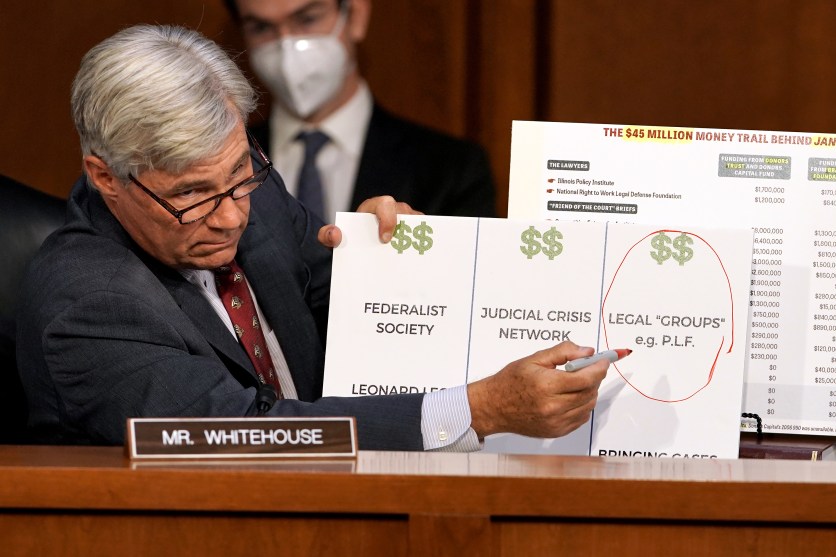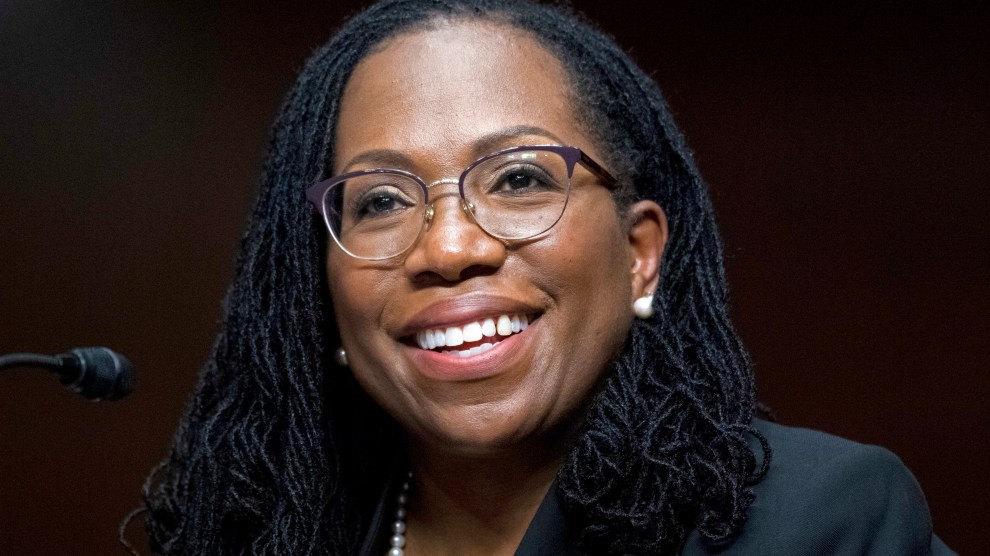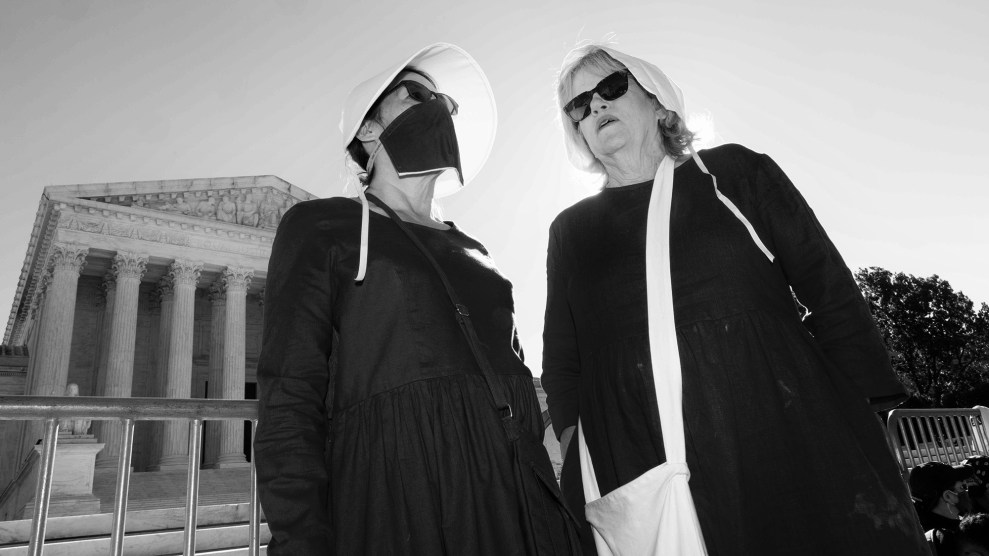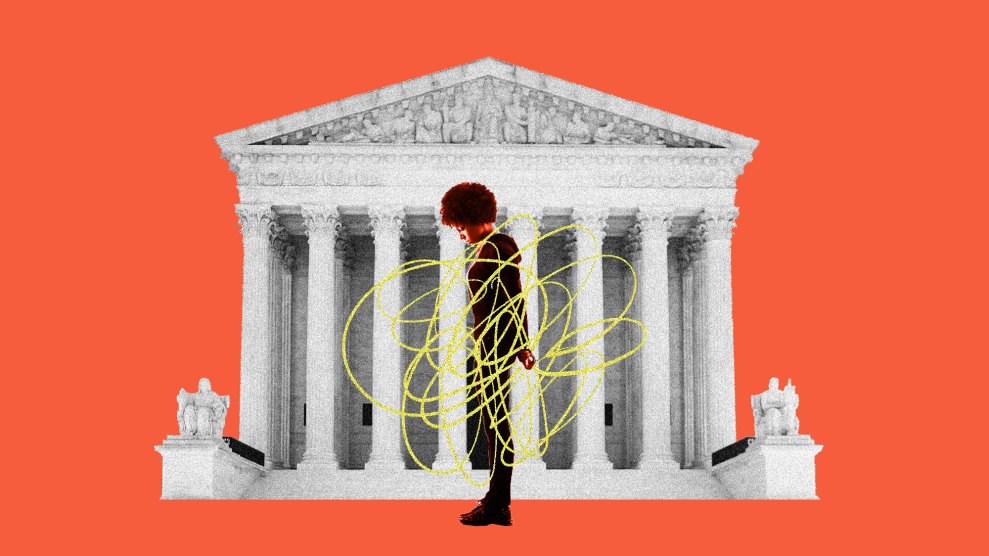
Sen. Whitehouse during the October 2020 confirmation hearings for Trump Supreme Court nominee Amy Coney Barrett.Greg Nash/Zuma Press
This story was originally published by the Guardian and is reproduced here as part of the Climate Desk collaboration.
The US Senate is not a crowded, rambunctious place like Britain’s House of Commons or other more lively legislative bodies around the world. Members are accustomed to speaking among row after row of empty desks, unheckled by absent colleagues. This has not deterred Sen. Sheldon Whitehouse (D-R.I.) from stepping into the arena to champion urgent causes.
For almost nine years, the Democrat took to the Senate floor every week the chamber was in session to demand that attention be paid to the climate crisis. He retired the “Time to Wake Up” series last year after 279 speeches only to revive it again this year.
But now he has another alarm to sound: “The Scheme” is a series about the plot by rightwing donor interests to capture the Supreme Court and achieve through the institution’s power what they cannot through other branches of government.
For each speech, Whitehouse, whose desk is on the back row, rises to his feet beside a mounted sign with the words “The scheme” superimposed on an image of the court’s exterior. He expounds on the decades-long roots of the master plan, how it was watered by “dark money,” and how it bore full fruit when President Donald Trump installed a six-justice right-wing majority on the court.
In an interview with the Guardian, Whitehouse, 66, explains why he has no faith in Trump’s three appointees—Neil Gorsuch, Brett Kavanaugh and Amy Coney Barrett—and acknowledges the embarrassment that Democrats were “sleeping sentries” as the threat unfolded.
But first, does it bother him that he is not playing to a full house, perhaps shouting into the void? “One gets used to it in the Senate,” he says phlegmatically, sitting in a meeting room at his Capitol Hill office adorned with framed photos of lighthouses and starry skies from Rhode Island, the tiny state that he represents.
“Actually the last time I went out, a little troop of people who I didn’t recognize came out of the Republican cloakroom and went and sat on the staff bench on the other side and watched and then, when I was done, they trooped back off. I don’t think I have a fan club, but somebody wanted to get a report.”
The thread running through Whitehouse’s spoken essays is that the current 6-3 conservative majority on the court is no accident but the product of special interests and dark money—hundreds of millions of dollars in anonymous hidden spending.
Whitehouse chose his title carefully. “It implies that this is not random,” he says. “This is not just, ‘Oh, we’re conservatives, and so we’re going to appoint conservative thinking judges,’ which is the veneer. They would like to maintain this is just conservatives being conservatives.”
He suggests that the model of “agency capture,” when an administrative agency is co-opted to serve the interests of a minor constituency, was applied to the supreme court. “Once you’re over that threshold of indecency, it actually turned out to be a pretty easy target. The other construct to bear in mind is covert operations, because essentially what’s happened is that a bunch of fossil fuel billionaires have run a massive covert operation in and against their own country. And that’s a scheme.”
The senator has delivered 12 of the speeches so far. The first, last May, was entitled “The Powell Memo.” It focused on Lewis Powell, a corporate lawyer from Virginia in the 1950s and 1960s, a period of political turbulence that rattled America’s corporate elite. The US Chamber of Commerce commissioned from Powell a strategic plan for reasserting corporate authority over the political domain.
One section of Powell’s secret report, called “Neglected Opportunity in the Courts,” described “exploiting judicial action” as an “area of vast opportunity.” He added that “with an activist-minded Supreme Court, the judiciary may be the most important instrument for social, economic, and political change.” The report was dated August 1971; two months later, Republican President Richard Nixon nominated Powell to the Supreme Court.
Whitehouse comments: “Having given the US Chamber of Commerce that warning and laid out that strategy, he then went on to the court and in three very significant decisions created a role for corporations in American politics that had never existed and was clearly not something that the founding fathers thought about or would have approved. Since then it’s gotten worse, but he teed it up in those earlier decisions and set the Republican justices of the court on that pathway.”
Another key player in the story is the Federalist Society, founded in 1982 by law students who wanted to challenge what they perceived as the dominant liberal ideology. Its co-chairman and former executive vice-president is Leonard Leo, who also advised Trump on judicial selection.
The Federalist Society “first showed its fangs” in 2005, Whitehouse says, when President George W. Bush chose Harriet Miers for the supreme court. “The Federalist Society came forward to defeat the nomination of an extremely talented lawyer by a Republican president because she was not, to quote what was said at the time, ‘one of us.'”
“It was at that point that the grip of this little donor elite and Leo, its Federalist Society operative, really took hold. Justice Samuel Alito was the product of that and he has proven himself on the court as being a faithful workhorse for that dark money corporate right-wing crew.”
There was no better example than 2010 and the Supreme Court’s 5-4 ruling in Citizens United v Federal Election Commission, which allowed wealthy donors, corporations and special interest groups to spend unlimited cash on elections. Since then an estimated $6 billion in dark money, often from nonprofits that are not required to disclose their donors, has poured into political campaigns.
The Kryptonite to the scheme is transparency because it would enable the public to follow the money. So donors depend on the court to preserve their anonymity. The senator highlights last year’s case of the Americans for Prosperity Foundation, front group of the wealthy Koch brothers that successfully sued to prevent access to donor information.
Not surprisingly, the court’s reputation for independence has taken hit after hit and Senate nomination hearings have become partisan gunfights. In 2019 Chief Justice John Roberts felt compelled to push back: “We do not have Obama judges or Trump judges, Bush judges, or Clinton judges. What we have is an extraordinary group of dedicated judges doing their level best to do equal right to those appearing before them.”
“Piffle,” says Whitehouse. “They’ve got to try to keep the veneer. The instant that Roberts admits, ‘Okay, this is a captured court, we’re here to do dirty deeds for the big donors that got us on to the court,’ then they kind of blow themselves up.”
“So they’re not going to do that. Keeping a veneer that we’re all actually very serious judges here and this is all on the up and up is important to the success of the scheme.”
He adds: “The difference is the evidence of their behavior. There are things that are inexplicable in a legitimate court.”
Anonymous donors gave tens of millions of dollars to the Judicial Crisis Network, a rightwing advocacy organization, to fund advertising campaigns supporting Gorsuch, Kavanaugh, or Barrett for the Supreme Court. Whitehouse does not believe they are impartial justices.
Whitehouse predicts that court will “nibble away” at Roe v Wade, the 1973 decision enshrining a woman’s right to an abortion. “There are some things that it’s not worth doing all at once and creating a big political blowback,” he says, comparing it to rulings on Barack Obama’s signature healthcare law. “If my theory is correct, they have an eye to the political winds and don’t want to step out too far if they don’t have to. As long as they are continuing to feed the anti-choice base, step-by-step is fine.”
A similar pragmatism may play out when it comes to filling the vacancy left by Stephen Breyer, a liberal justice who last month announced his retirement. Whitehouse, who does not have a preferred candidate, says: “If you’ve captured the court already and you’ve got 6-3 and it’s doing what your big donors want, you don’t want to create a ruckus, you don’t want lots of controversy. It’s going to be 6-3 before; it’s going to be 6-3 after.
“The more Mitch can lower the temperature and have everybody think that the Supreme Court is just normal—nothing to see here, folks—that’s in his interest. The more that the red meat attack is not against the candidate but against Democrat dark money, the more you have success in the propaganda wars to fool the public about what you actually did.”
Democrats have been criticized for being complacent as Republicans unspooled their 50-year campaign to capture the courts. Whitehouse agrees. “It’s way late. It’s really embarrassing how we let this dark money crowd steal a march on us.”
He observes: “From a political perspective it never mattered as much to the Democratic base as it did to the Republican base because we did not have the history of Roe v. Wade, Brown v. Board of Education [desegregating public schools], decisions that provoked massive cultural objections on the far right.”
“So they got highly motivated and we did not, but then once we saw this machinery begin to go in operation to capture the court, we never bothered to call it out either. It’s not just that our base didn’t care as much. It’s that we were sleeping sentries.”
Whitehouse is planning at least three or four more speeches about The Scheme. As with his climate series, he hopes that the message will get through: It is time to wake up.
“I hope there’ll be a more general understanding that what’s going on at the court has a lot less to do with conservatism than it has to do with capture and, with any luck, it might cause a bit of an epiphany with some of the judges that they don’t want to be associated with what they’re actually associated with. And the American public will see it for what it is and give us in politics more opportunities to administer a repair.”








